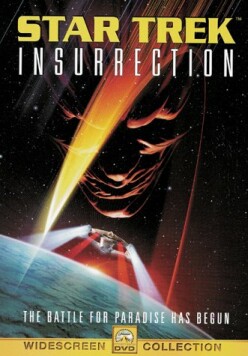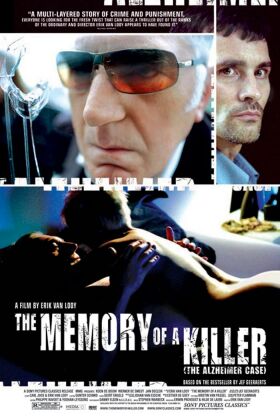Star Trek: Insurrection
Star Trek: Insurrection, directed by Jonathan Frakes, is another black-
box movie — which is to say a movie that elevates the deus ex machina
into a guiding principle. I know that I risk offending a lot of Trekkies who are
used to this kind of thing, but I find it merely boring. Every time the
characters get into any kind of difficult situation, some new machine is
produced, or some technological mumbo-jumbo is pronounced, and instantly the
problem is solved. Such a movie reduces, in the post-modern style, dramatic
conflict to a photo shoot. That is, it is not really “about” the ostensible problems and
their solutions, but about the coolness of the masters of the
machines — who, because we never really fear that they will come to any
harm, are in essence themselves part of those machines. The character of the
highly sympathetic robot, Data (Brent Spiner), is an ironic acknowledgment of
the fact.
And so is, though it may not seem like it at first, the fact that the
technological romance is built around a group of gentle hippie technology haters
called the Baku. The Baku, however, only don’t need the USS Enterprise’s
formidable array of black boxes because they are already beyond having any of
the problems that the black boxes solve. They are actually highly sophisticated
technology understanders — presumably by the information that is printed in their
genetic code since they never use it — who have rejected both machines and
weapons. Their hippie commune is seen as the highest form of civilization, and
its people are eternally young and attractive because they are constantly
rejuvenated by another technological soup — a fountain of
youth — vaguely described as “unusual metaphasic radiation.”
Of course, some bad guys, led by a renegade Federation admiral and an ex-Baku
called Ru’afo (F. Murray Abraham) in an Invisible Man mummy wrap, want to take
their marvelous planet and its metaphasic radiation away from them. The brave
Captain Jean-Luc Picard (Patrick Stewart) has to resign his commission (like
every other calamity, this doesn’t last long) in order to save them. He falls in
love with one of the most handsome of the Baku’s centuries-old maidens, Anij
(Donna Murphy), who doesn’t look a day over 350. Naturally, the Baku make
explicit what is already explicit in the gentle creatures who sail the
Enterprise and only kill with the greatest of reluctance. “Disarm yourselves,”
Picard and his crew are warned when they arrive. “This village is a sanctuary of
life.”
They also tell the space warriors that “Our technological abilities are not
apparent [only] because we do not choose to employ them in our daily lives.” And they don’t
choose to employ them in their daily lives because they regard the use of
machines they regard as a derogation of humanity, which seems a strange attitude
indeed when humanity is indistinguishable from machines. But of course the Baku
are merely a sentimental gesture of the kind long beloved of Hollywood. They
“came from a solar system on the verge of self-annihilation” by fearsomely
destructive weapons. See if you can guess the analogue! Hence they are
pacifists. “The moment we take up a weapon, we become one of them. We
lose everything that we are,” they claim.
Yet they don’t seem to mind when Picard and Co take up arms to defend them.
Perhaps that’s because, apart from poor Ru’afo, the only things that get hurt
are more machines: ray-emitting “drones” that fly about like large metal
horseflies and are shot down like skeet by the Enterprise’s guys and gals with
their futuristic shot-guns. After all the mock perils have been passed, the mock
warriors, including Data (“Androids do not have fun,” he laments), learn the art
of living and playing from the gentle hippies. “You have to have a little fun
every day,” says the hippie boy who has struck up a friendship with the robot.
I’ll buy it too, but there’s just not much fun in this movie.
Discover more from James Bowman
Subscribe to get the latest posts to your email.






